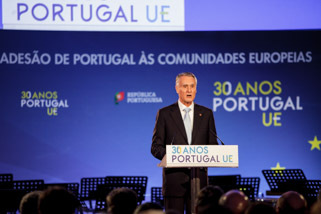
We commenced, a short while ago, in Luís de Camões Square, the celebrations of another National Day of Portugal, Camões and the Portuguese Communities, the second time it is held in this City of Guarda.
Facing the imposing Cathedral, an emblematic monument of the city that welcomes us, we evoke our Country: past, present and future.
We are in a mountainous region, where the views are extraordinarily grandiose. We are in this frontier land, where men fought each other and nowadays meet.
Today, Portugal is once again in Beira.
Thirty seven years ago, this city that rises from the mountains, dressed in granite and enclosed in the proud rudeness of its landscape, received the first 10 June celebrations that took place away from Lisbon.
Guarda is today a very different city. Portugal is also a very different country.
Surrounded by fortified walls in former times, the city has now descended the hillsides, softening the outline. The mountains, previously an obstacle, are now crossed by new routes of communication.
These routes broke down our secular seclusion, peculiar to that of a distant European. We have now become fully European and also here, in Guarda, we have available the best access to the remainder of Europe.
Guarda was always a traversing zone, which eased circulation between the coast and the interior, between North and South, a doorway to Portugal.
Only that Guarda, seeming so distant in prior times, is nowadays a player in a strategic project which benefits from the dynamism of the responsible local authorities and entrepreneurs.
Its location, in any case privileged, can be representative of an economic asset and allows it to demand being more than a traversing point.
The setting up of new companies in the county and district of Guarda, heavily investing in innovation and development, is the proof that interiority can be overcome and that the fatality of geography does not correspond to the fatality of desertification.
Local authorities, with the support of the central Government, have a fundamental role as catalysers of the development of their Municipalities.
More than just wait for investment to arrive, they must actively look out for it, exploiting endogenous potentials, betting on the dissemination of the historical heritage and traditions, attracting tourists.
The air that is breathed here, the Air of Guarda, gained for this city a few years ago the designation of “Iberian Bioclimatic City”. The pure air that earned it this name is, in itself, and added value that must be exploited.
Guarda, historical and cultural centre, carries us to other times, between stones worked and erected by man, who thus modelled nature and based its life in the face of the rigours of the climate. The conservation, dissemination and valuation of Guarda’s heritage and traditions must be considered as priorities of local political activity.
Mister Mayor,
Ladies and gentlemen,
Thirty seven years later, and in spite of all that makes it a European city, it is essentially the same Guarda that welcomes the Celebrations of the National Day of Portugal: beautiful and bounteous, cold, strong and faithful.
Beautiful, due to the charm of the landscapes that surround it and to its imposing monuments.
Bounteous, due to the richness of its lands, the diversity of its natural resources and the potentials it encloses.
Always Cold, due to the glacial winds from the mountains that surround it, but not in the way it welcomes its visitors.
Strong, because from being an insuperable fortress, it is now a city of reference in the interior of our country.
And always Faithful, as Álvaro Gil Cabral, Alcalde-Major of Guarda, who was always faithful to its people, opposing the Castilians in the determining moment when our nationality was being forged.
My best thanks, Mister Mayor, for the words you addressed me and for the reception provided us at the beginning of these celebratory days, an occasion to reflect on what we were, what we are and what we want to be.
Ladies and Gentlemen,
The Square where the National Standard was solemnly raised this morning is named after the great poet whom we celebrate on this date. Luís de Camões is the major symbol of the Portuguese Language, a heritage that places us in the central nervous system of a community numbering millions of people, with whom we have unique relations of proximity.
In his Labyrinth of Nostalgia, Eduardo Lourenço, who Portugal recognizes as one of its most brilliant thinkers, tells us that Camões is “an exemplary expression of a moment of our history and of the greatest adventure of Western expansion”.
His alert, however, is that we must not allow ourselves to become enmeshed in the nostalgic labyrinth that the epic of Camões may suggest.
The People of Guarda know as the Garden of Fear a labyrinth that exists in this city, exactly due to the feeling it may evoke of ignorance of the path to be followed.
In the labyrinth that, as a people, History had in reserve for us, we have experienced moments of difficulty.
We asked ourselves where we started to tread this path, understood how and why we arrived here. It is fundamental that we avoid past mistakes, in order that future generations do not have to repeat the same sacrifices.
We are finally able to see the direction we must take. With our eyes on the horizon which is our future, we have, jointly, at the present time, to once again seek the right course for our country.
It is time for fear to give way to hope.
Thank you very much.
© 2006-2016 Presidency of the Portuguese Republic
You have gained access to the records of the Official Site of the Presidency of the Republic from 9 March 2006 to 9 March 2016.
The contents available here were entered in the site during the 10 year period covering the two mandates of President of the Republic Aníbal Cavaco Silva.